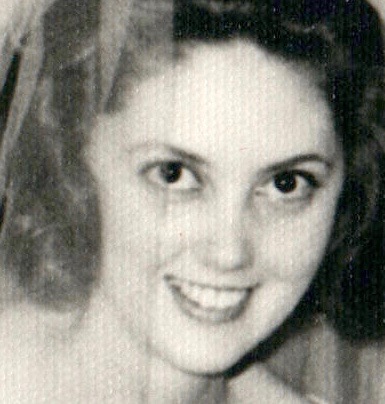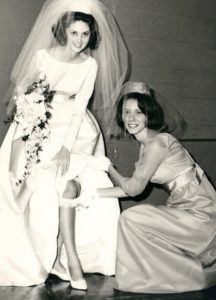Today I opened my email and found a message from a Pat Fillinghim—a name that meant nothing to me. She wrote, “Peggy, I have tried to find you forever. Tried Terry and discovered that she’s died…”
Pat! It was Pat Sayles, my friend of longest standing, the person I met in the sixth grade in the first year I moved to Tulsa. She had sent the message one minute earlier. I started replying immediately, and two hours later we were talking on Facetime. That wouldn’t have been possible sixty-five years ago, when we first met.
“Ha,” she said when she saw me. “We both have white hair!”
We talked about a lot of things—how both of our younger brothers had variously eaten, smoked, and, for mine, also drunk themselves into early graves. “Corky ate nothing but hamburgers and French fries,” Pat said, “and he wouldn’t quit smoking. He had asthma as a kid, and our father died of lung cancer without ever having smoked. The doctor told Corky, ‘You have two strikes against you already. You have to quit.’ You know what Corky said? ‘It has to be bad for you to do something as painful as stopping smoking is for me.’ So, he died of lung cancer six years ago.”
In the last nine months of his life, my brother Geoff did quit drinking—as many as three fifths of Scotch a week—but by that time, he was on morphine, so I’m not sure giving up alcohol counted as a health measure. Geoff died ten years ago; he was just sixty-two.
It turned out that our friend Terry Shurig Farrier died only this last August. “I thought she might know how to find you,” Pat said, “but when I went looking for her, I found her obituary. It said she died in her sleep.” We agreed that this was good.
It was a wide-ranging and highly personal conversation, and it was sweet beyond measure. Pat is on her fourth marriage—two were to the same man: her first husband, Mike. “I remember,” I said, “at the wedding reception dinner when Mike told you to stop chewing ice. I thought, ‘That’s not good.’”
Both Pat and I had spent our early married lives trying to live up to what our husbands wanted from us.
“But I liked your Ed,” she said. “I thought he was nice.”
“He could be lovely,” I said. “But then he would close into himself and have nothing to say–for months.” It’s lonelier to live with a person like that than it is to live alone.
Pat met Ed when she came to visit us on R ‘n’ R from her husband. She was pregnant for the second time, and he’d started sleeping with his secretary and had decided that he didn’t want to be a father. Pat should have an abortion, he told her, “And he wanted us to give up the child we had for adoption,” Pat said, “the one-and-a-half-year-old.
“Now, I ask myself: How could I remarry such a man? I can’t fathom it. But I so believed in marriage. I thought I should be able to make it work.”
I told Pat a story about Terry’s first husband, Joe, that I don’t think I’ve ever told anyone. “He was a piece of work,” I said.
“He was very bad,” Pat said. “He was terrible to her.”
Then I explained how I had once seen how bad Joe was. Terry and I were both at O.S.U. We’d gone out on a double date—Terry with Joe and me with a friend of Joe’s they’d fixed me up with. Joe was a little older than the rest of us; he’d been in the military and was now going to school. This was a friend of his from the service. We all went out on a picnic of some kind, and there was something strange that happened with a pill. Joe seemed like he was going into some kind of a fit, and his friend got a pill into him, and it calmed him down. I went into the glove compartment and got one of the pills, taking it with me. I don’t know what I thought I was going to do with it. Have it analyzed? But how?
What I did was to tell Terry my concerns that Joe might be a drug addict of some kind. Of course, now I know that this isn’t the way drug addicts behave, but I didn’t know that then. Anyway, what Terry did was to tell Joe.
Joe called me and said he wanted to talk. He picked me up at the sorority house, and we went on a little drive in the Oklahoma flatlands around the Stillwater campus.
Joe told me, “When I was in the Marines, they taught me fifteen ways to kill a person without that person’s ever making a sound.” He paused. “I can kill a person in a lot more ways than that, ways where they might make just a little sound. But fifteen of them are absolutely silent.”
Then he said, “Am I making myself clear? If you ever do or say anything again that might come between me and Terry, I will kill you. I will definitely kill you.”
I was eighteen at the time, and I wasn’t a particularly courageous person. The one thing I knew for sure is that I couldn’t talk with Terry about this. And what if I went to some counselor at the school? They would call Joe in; he would deny it. It would be his word against mine… And then he would silently kill me. Or so I thought.
I said nothing. To anyone. The next year, I ended up transferring to another school that was better for my major, and the year after that, my friend married the man I knew was crazy… and had several really bad years. In the end, she had to sneak away from him with their baby; she feared for their lives.
“I’ve always felt terrible about that,” I said to Pat. “But I didn’t know what to do.” I thought about it for moment. “If it happened now, I would go to a counselor.”
Pat didn’t comment. What could she say? At seventy-five you have a better chance of seeing your mistakes. At least some of them.
And it’s a great solace to talk them over with someone who knows who and what you were at the time.



Thanks for sharing this, Margaret! What a horrendous memory. It is interesting to think about how we might have behaved differently in prior circumstances. And so eye-opening to realize that we’re training our citizens to kill people silently in 15 ways! Oofeeda. A chilling story, for sure. I”m glad you guys had a chance to process all that a little., not to mention renew a wonderful friendship! “Make new friends, but keep the old…”